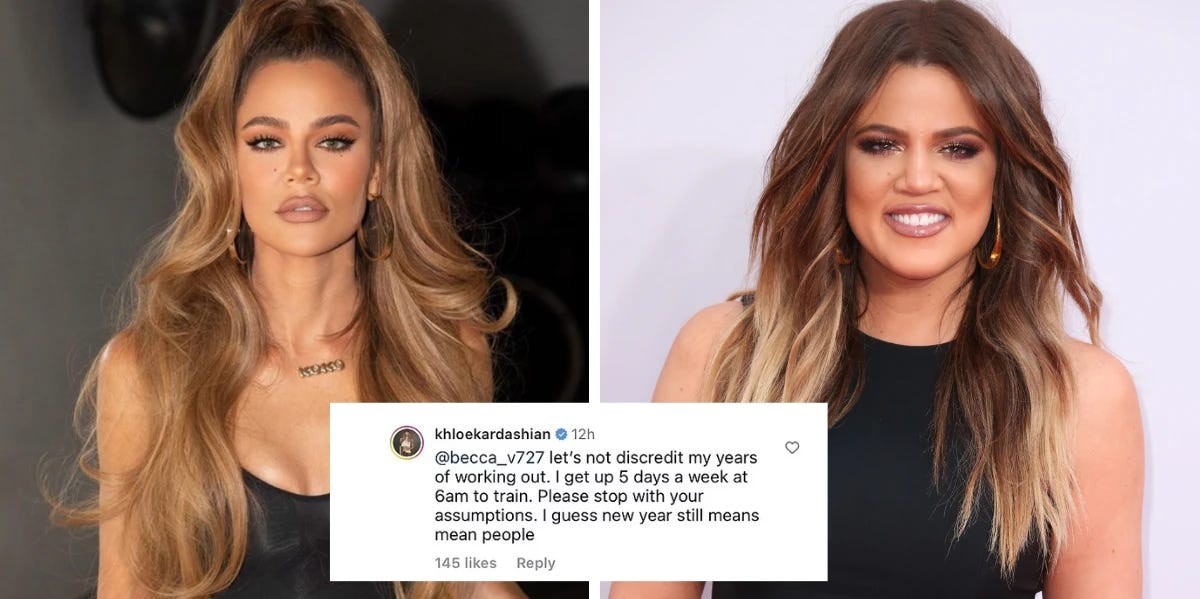Scapegoating is the New Gaslighting
The new psychological PR tactic for celebrities in hot water
Over the last few years, we’ve been beaten over the head with the term “gaslighting” which has often been used incorrectly by those born before 1980. As a refresher, “gaslighting” is not synonymous with “throwing gasoline on a fire.” Rather, the psychological term gaslighting refers to a form of manipulation and psychological control in which an abuser “false information that leads them to question what they know to be true, often about themselves.” (via Psychology Today) This is a tactic that is often used by those with narcissistic tendencies to shift blame and manipulate the victim into seeing themselves as the abuser.
A great example of this is when Khloe Kardashian claps back at fans accusing her of being on Ozempic by saying, “I get up at 5 a.m. every day to work out!” First of all, both things can be true. But also, she doesn’t even deny it, she only calls out what she wants the public to remember, and shifts the blame from her, who is likely taking medicine that is either life-saving or hugely helpful for someone else, for vanity, to the public for speculating on her private life.
The word gaslighting was even named last year’s the Word of the Year by Merriam-Webster, which reported a 1740% increase in searches for the word in 2022. And as someone who’s spent the last 25 years in therapy, I’m glad that we have collectively grown more aware of this nasty, common strategy often used on us by not only our families and romantic partners but by public figures as well.
What is scapegoating?
However, I’ve noticed that as we grow savvier to the tactic of gaslighting, there’s been a rise in scapegoating as a PR tactic in Hollywood. Psychology Today categorizes scapegoating as an ‘ego defense’ in which a narrative is centered around creating a villain.
“…uncomfortable feelings such as anger, frustration, envy, guilt, shame, and insecurity are displaced or redirected onto another, often more vulnerable, person or group. The scapegoats—outsiders, immigrants, minorities, 'deviants'—are then persecuted, enabling the scapegoaters to discharge and distract from their negative feelings, which are replaced or overtaken by a crude but consoling sense of affirmation and self-righteous indignation.”
Psychology Today also explains that the presence of a (fictional) villain implies a hero, which is, of course, the scapegoater.
Most recently, we’ve seen a few instances of scapegoating in the two most dominant pop culture news stories lately: Scandoval and the Bieber vs. Selena Gomez debacle.
Scandoval
Little tidbits have come out about Tom and Ariana’s relationship since the news broke. We’ve learned from the mid-season trailer of the show that they were only intimate approximately four times a year, according to Sandoval, which seems to be his mounting defense for his egregious crimes with Raquel. It was also leaked that perhaps Ariana and Tom explored an open relationship, which the trailer also seemed to confirm. A clip was shown of Tom Schwartz commenting, “Open relationships can be tough,” in addition to Ariana saying she, “can’t have sex with someone she considers a stranger.”
Meanwhile, Raquel has been taking (her version of) accountability. In her statement, while clearly written for her, she owns her role in the mess and shares that she’d been working with a therapist to delve into why she exhibits codependent tendencies and is addicted to the feeling of being loved. While invoking a bit of ‘woe is me’ vibes, she still avoids pointing the finger elsewhere.
Raquel’s role in this mess is much larger than Tom’s considering the number of people she hurt in comparison, so it makes sense she’d tread more lightly with her approach. However, Tom Sandoval’s attempt to cover his ass by blaming Ariana for not putting out enough is an obvious and sexist attempt at scapegoating. The idea that one party is simply withholding sex from the other is an antiquated idea of a relationship because as the old saying goes, it takes two to tango. But of course, Sandoval is too big of a narcissist to ever stop and wonder why a woman would not want to have sex with him.
Further, there is simply no excuse for starting a full-on secret affair with a member of your social circle, someone you’ve welcomed into your home on numerous occasions. While I understand the human condition is nuanced and we all have physical needs, there is a difference between an in-the-moment mistake and a premeditated, drawn-out lie.
Bieber vs. Gomez
I swore I was done writing about this but it continues to be relevant! Recently, Selena Gomez posted on her Instagram story that Hailey Bieber had reached out to her about receiving death threats and asked fans to treat others with kindness. This is not the first time Selena has addressed the fan response to the suspected feud. However, Hailey’s own husband has been completely silent on the matter, contributing only the occasional Instagram photo with a basic caption to the conversation. So, why does Selena have to be the one to speak up?
While Hailey along with her friends Kylie and Kendall Jenner have been crowned the ‘mean girls’ of Hollywood, it’s interesting that they are unwilling to tackle the fan response themselves. It’s also notable that despite receiving unflattering comments on her frequent Instagram posts, Hailey has not restricted or limited them. In my opinion, I believe she does this to allow all of the hate comments she can get, in order to make Selena and her fandom appear to be “the problem.”*
Hailey and Justin have been married since the summer of 2018 and yet Selena is who has to repeatedly come to Hailey’s defense, while Hailey sneaks in as many digs as she can.
*I am not insinuating that Selena does not have insane Stans because every fandom does have crazy internet fans that act out of pocket. But that is why celebs should protect themselves online.
Why use the scapegoating tactic?
Utilizing the scapegoating tactic as a PR strategy may work as a short-term defense because it brings nuance to a situation that may seem black and white. When you’re being piled on by the public, it may help your case to draw attention to another individual involved to diversify the conversation.
In Tom’s case, adding that Ariana wasn’t giving it up may get some Joe Rogan fans on his side — CONGRATS! And Hailey’s poor, pitiful me performance will probably win over some 24-year-old white women who get their therapy from TikTok.
In essence, scapegoating may allow the celebrity to win some new fans who relate to their perspective, after ostracizing some of their old ones.
Will “Scapegoat” be the Word of the Year for 2024? Only time will tell.







